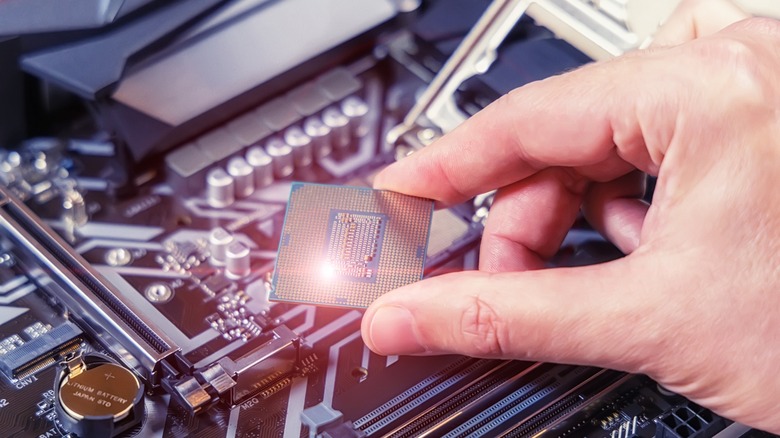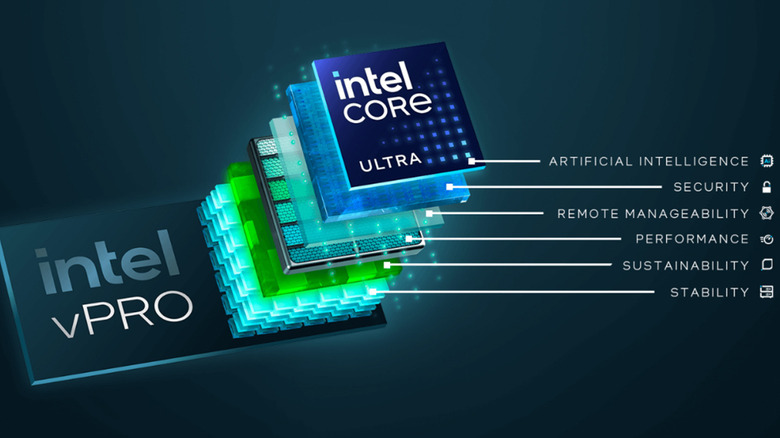Everything To Know About Intel's vPro Platform
With Intel's recent rebranding of its processor lineup, the Silicon Valley giant has been making huge strides in the computing sector. The Intel Core Ultra chips powered by Intel's own Arc GPUs have brought about noteworthy performance and efficiency enhancements from previous generations, and, despite the overhaul in its catalog, it seems like Intel has more excitement to share — and this can be seen with the announcement of the latest Intel vPro platform at MWC 2024.
The inclusion of vPro technology into existing and upcoming Intel Core Ultra chips is set to bring improvements across the board for enterprise users. These upgrades include not just bumps in performance, but they also promise stability, manageability, and a huge emphasis on security. The platform will even use artificial intelligence to help perform tasks quicker and more efficiently. Let's take a slightly deeper dive to see what Team Blue has to offer going forward in 2024.
What does Intel vPro offer?
Intel vPro has been around for approximately 17 years and is largely a marketing term used for processors that come with a slew of hardware features that bring improvements to security, performance, and more. The launch of vPro for Intel's Core Ultra chips was inevitable, and now businesses have a solid reason to upgrade to better PCs that take full advantage of today's technology.
Aimed at enterprises and small businesses, the AI-enabled performance boost that the new vPro platform brings is said to deliver a more productive environment, with less waiting times for things to load or render. Intel's new Core Ultra chips bundle a new neural processing unit, or NPU, alongside the CPU and GPU, and this utilizes AI to handle sustained background tasks at higher efficiencies — promoting better battery and more headroom for the CPU to perform extra tasks.
Thanks to Intel's Threat Detection Technology found in vPro-powered chips, security is another aspect that has seen upgrades. Utilizing machine learning algorithms, your PC is able to detect and combat ransomware attacks that take place on a hardware level. The NPU's AI capabilities mean you can now scan your computer not only faster, but without slowing down your ongoing tasks. Intel vPro also offers protection against zero-day exploits, malware hidden in the memory — such that you no longer need to worry about some of the most infamous viruses leeching to your PC.
It's not all about performance
With productivity and security handled, Intel's new platform is also striving to bring a better experience in terms of system stability and enterprise manageability. Intel's Active Management Technology, or AMT for short, allows system administrators to remotely manage enterprise computers, even if they are powered off or non-responsive. The Endpoint Management Assistant further brings remote access to securely manage PCs across the network, or through the cloud.
The Stable IT Platform Program (Intel SIPP) ensures long-term stability and reliability for the provided hardware. Enterprises are usually reluctant to upgrade to newer versions of the operating system, but Intel claims the new vPro technology offers a more seamless transition from Windows 10 to 11.
Alongside Core Ultra chips, Intel's vPro platform extends its fleet of hardware features to ChromeOS and Intel Evo-certified devices. Enterprises with Intel vPro-based PCs had over 40% fewer support tickets, owing to the hardware's higher reliability. This also brought about a 23% decrement in security breaches. Intel has already begun collaborating with manufacturers like Acer, Dell, HP, and Lenovo to deliver the benefits of vPro technology in over a hundred designs, spanning across laptops, 2-in-1 notebooks, and tower PCs.


